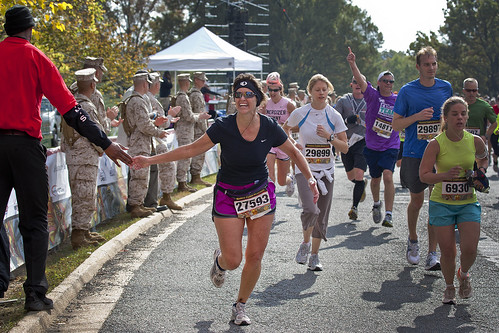Philippides, the courier behind the legendary origin of the race, was reported to have run from Sparta to Athens and back bearing news of victory over the Persians in the Battle of Marathon.
A feat of endurance, to say the least. 
Today, there's less patriotic urgency and a few more clothes involved, but we owe thanks to Philippides for what has now become a traditional challenge for the every-man/woman willing to take on the 26.2 mile race.
Fortunately for us, we have a little more time for planning and preparing our bodies than he did, when it comes to that long haul. Marathons require commitment and dedication from us. But what exactly does that mean when it comes to training, nutrition and all together health? Theories and opinions always seem to be changing as more research is taken into account by nutritionist, biologists and running trainers. More sports drinks, high-fat diets and low carb loading, specific fats and high carb diets. What's worth paying attention to? For every runner, especially first time marathoners, the advice across the board can become very confusing to interpret.
That's why we recommend sticking with the tried and true basics when it comes to the foundation of your training.
The Basics of Marathon Training
-
- Before taking on any large challenge, talk to a doctor and make sure your body (heart, lungs, liver etc.) can handle it. If there's a problem, that should be your priority, not intensive training. If you're given the green light, make a conscious effort to stay that way. Be conscious of the weather to stay dry and warm after a workout. If this means grabbing a dry shirt before leaving the gym to avoid a chill, do it.
- Listen to your body. Your body is going to signal you if something is wrong. Toes bleeding? Back aching? If it hurts now, imagine how that pain will inhibit you at mile 20. You may need new shoes, or more core work to support your weight.
- Protect your body when training.
- Everything that can chafe will. Inner thighs, under arms, nipples. The least bit of friction, from skin against skin or poorly planned clothing, can cause a whole range of discomfort. Talk to someone about prevention methods, such as lubricating products, strategically placed bandages and choosing breathable material over cotton, BEFORE you experience chafing, not after.
- Monitor your sleep.
- On average, doctors now recommend between 7-9 hours of sleep for a healthy body. But you are in training, so your body needs longer to rest and heal. For aerobic, or endurance, training at least 8 hours, if not 9-10, is essential for a body to recover mentally and physically.
- It's not enough to get a good night sleep the night before the race, it's probably not going to happen anyway, you are too excited. Sleep needs to be regular and restorative in the days and weeks prior.
Have a Flexible Training Plan
-
- Set a plan and goals for yourself that you can follow the weeks and months before the race. Make sure the goals are realistic, and the plan has the ability to be adjusted to your personal needs. No schedule is ever going to be perfect, so being able to fidget with schedules and timing a bit will reduce stress and help you stay on a productive track without feeling defeated.
- Use Periodization.
- Periodization, or training cycles, are incredibly important in endurance training. Upping intensity daily without rest or variation, is going to overwhelm your body. Here's an example of how to used periodization in your weekly training:

- Practice Negative Splits.
- What this means is train yourself to start off slow for your long runs. The event you are training for is a marathon, not a sprint. Cover the second half of your distance for the day at a faster pace than the first half.
- Stay relaxed and pay attention to your form. How you run is just as important as the pace you keep. Shoulders down, arms relaxed, and body upright.
- Taper down intensity 4 weeks before the race.
- The general recommendation, after periodic training, is to taper down the intensity of your workouts by a percentage each week, allowing your body to rest before the big event.
- The last 4 weeks before a race should taper from your normal pace (100%) as follows: week 4= 80%, week 3= 60%, week 2= 40%, week 1= 25%
- Remember stretching and core training.
- Studies show that yoga adds core strength and flexibility that can reduce injuries and improve a runners performance.
- Be gentle, and don't over-stretch, especially before running, which can have a negative effect on a runner.
Eat Consciously
-
- What a proper training diet consists of has been widely debated. High carbohydrates, low carbohydrates? There will always be differing opinions. Regardless of method choice, what's important is maintaining balanced physical health.
- Weight is a factor.
- Maintaining low body fat percentage is essential to boosting pace and endurance.
- If the percentage of carbs you consume is too high and from a negative source (fried foods, sweets etc.) the more weight from fat your legs and back are going to have to manage as you run. There's a reason the record-setting runners are lean. They don't have any unnecessary body mass holding them back.
- Most trainers agree that your BMI (body mass index) should be on the lower side of normal for ideal running fitness.
- Choose the right foods.
- Easily digested carbs are where the power is. If you're on a carb-free diet, and plan to run a marathon without energy depletion or "hitting a wall" before the last 5-6 miles, you're not being realistic. The amount of carbs needed daily, is going to be dependent on the amount of training done. So be careful not to overload when it's not necessary.
- The most common cause of "hitting a wall" in the last stretches of the race is glycogen depletion. Glycogen is a fuel derived from dietary carbs which is stored in small amounts in the muscles and liver. It is essential to endurance challenges, and should be stored and conserved through good pacing and high quality food consumption.
- High-quality foods: fresh, non-starchy vegetables such as quinoa and artichokes. Fruits, as with veggies, fresh not frozen. Also stick to lean meats and fish, Greek yogurts, whole grains, nuts (almonds over peanuts) and seeds.
- Hydrate.
- There's nothing more important than keeping your body hydrated as you train. Dehydration will not only decrease your energy drastically, but can lead to heat-related injury to your body. It's a marathon, you are outdoors running and you are sweating. Replacing bodily fluids is essential to avoid exhaustion and possible heatstroke.
- Learn to drink and run. You will need those little Dixie cups, so your body needs to know how to handle fluids on the go. Start practicing.
- Alcohol and caffeine aren't the greatest ideas during training. The first dehydrates you while the second raises your heart rate, and they both disrupt sleep patterns.
- Nothing new before the race.
- The last thing you want to do is eat something your body isn't entirely comfortable with the night before a race. Your body should be in rest mode, which includes your intestinal tract. Grabbing a spicy tuna roll or hitting your favorite Mexican restaurant can wait a few days. Nothings worse than attempting 26.2 miles with an angry stomach. Stick to what you know you can handle.
 Now, if you haven't already done so, start planning and training! And above all else, remember that getting through this challenge is all about attitude. Stressing out, losing sleep and pushing yourself too hard isn't worth it. Running a marathon today is about personal achievement, and if you can't find joy in your daily accomplishments, what else is there? Even Philippides was carrying good news.
Now, if you haven't already done so, start planning and training! And above all else, remember that getting through this challenge is all about attitude. Stressing out, losing sleep and pushing yourself too hard isn't worth it. Running a marathon today is about personal achievement, and if you can't find joy in your daily accomplishments, what else is there? Even Philippides was carrying good news.



